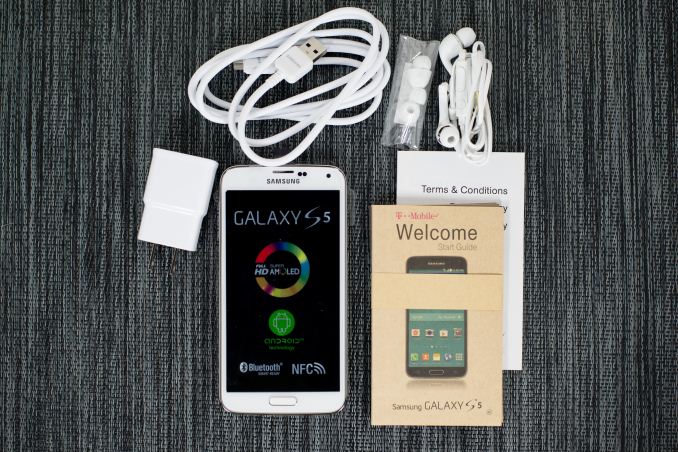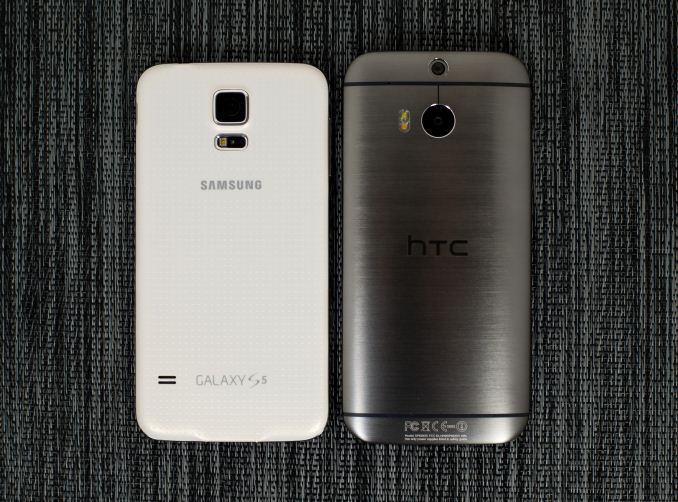Samsung Galaxy S 5 Review
by Anand Lal Shimpi & Joshua Ho on April 8, 2014 12:00 AM EST- Posted in
- Smartphones
- Samsung
- Mobile
- Galaxy S 5
Final Words
The Galaxy S 5 is a healthy update to the series. With the Galaxy Note 3's release last year we saw a device that ultimately became the new flagship from Samsung. The GS5 takes the crown back for those users who want a more reasonably sized device.
The GS5 sees upgrades across the board compared to its predecessor. The underlying silicon is both faster and more power efficient. The battery is larger, and battery life has improved dramatically thanks to silicon and display upgrades. Much like the gains we saw with HTC's M7 to M8 transition, anyone who is on a Snapdragon 600 based device today is going to be incredibly happy upgrading to a Snapdragon 801 platform like the GS5.
Connectivity sees a boost with the addition of Qualcomm's envelope tracker and support for carrier aggregation on LTE. The inclusion of 2x2 MIMO 802.11ac brings WiFi performance to a new level with the GS5.
The move to Samsung's own 16MP rear facing camera sensor brings about an increase in spatial resolution, and some improvements in low light performance compared to the Galaxy S 4. I'm not totally sold on the GS5's image processing but the overall camera experience is pretty solid. I would still like to see Samsung move to a slightly lower resolution sensor with larger pixels to provide a more balanced solution. As of now the GS5 is a solid shooter outdoors and with decent light, but indoors and in low light solutions it struggles.
NAND performance is about the only downside to the GS5's hardware upgrade, mainly in that it seems to ignore random read/write performance in favor of sequential gains. Anyone who has followed our SSD coverage at AnandTech should know the issues with this approach.
Display is also dramatically improved from the Galaxy S4. Samsung's AMOLED panels have finally caught up with LCD in most of the key metrics while retaining the key advantages of AMOLED such as infinite contrast and higher power efficiency at lower average picture level.
It's not all hardware upgrades that makes the GS5 what it is. Samsung did an excellent job of cleaning up its UI from the crowded mess that we saw in GS4 to something much more polished. It's not perfect, but a huge step in the right direction. While the GS4 felt more like feature creep for use in marketing materials, the GS5's software is far better executed.
There are even some nifty additions that can come in handy. Ultra low power saving mode is one in particular that seems to have a measurable impact on battery life if you're willing to give up some performance.
Overall the Galaxy S 5 is a solid replacement to the GS4 (and definitely to any previous Samsung device). I find that pretty much all the flagships offer some set of tradeoffs that prevent any one from being the perfect device (iPhone's screen size, GS5's materials, M8's camera). It's unfortunate because I'd really like to crown a single device the king of them all, but instead we're faced with a handful of differing optimization points. Samsung got it almost perfect with the GS5. With a metal body, a rear facing camera with larger pixels (perhaps with some tweaks to camera output processing), a better NAND controller, and stereo front facing speakers, the GS5 would probably be perfect.












296 Comments
View All Comments
Brian Z - Wednesday, April 9, 2014 - link
Yes you are a obvious fanboy.I have not said nor has anybody else said that Samsung wad the only one.
Hell this site has a theme going up where they update the benchmark cheating chart. But yet you still push your BS.
And Samsung was the only OEM to actually overclock the gpu. But since it's Samsung you got the nerv to even suggest well is it really cheating....
They complained loud and clear about this. In public on the reviews. In public on the podcast. Even in public we want Sony to send us a phone so we can see if they are cheating and add them to the chart
And now they are advertising the m8 in the article. So I guess you weren't paying any attention ever when a review compared different SoCs bins. Like the Samsung Galaxy s4 with its 1.9ghz s600 in the nexus 7 2013 article. Funny how that isn't advertising. Or when comparing screens on the tablets in the market. But of course you're a blinded fanboy so yeah.
They "discovered" the cheating not because it was Samsung. Because somebody on twitter Tweeted at Brian Klug and they investigated it from there. They weren't even looking for it period. And what did they do right after testing it on the Samsung device. Look at all the other players in the market to see if they were doing it. But facts and reality don't matter a delusional fanboy like yourself.
Oh and keep telling yourself aluminum is cheap crap. Aka a beer can.
Clueless uninformed pathetic fanboy
doobydoo - Friday, April 11, 2014 - link
TheSailorMan - you can't go round spouting fanboy crap such as iAnand and expect to be able to claim you're not a fanboy. You're worse than anyone else I've seen.TheSailorMan - Sunday, April 13, 2014 - link
I REPEATI'm not fan boy to any brand!!!!!
And you hippocrates, do not lie, that this all BS was not meant OLNY for bashing Samsung .
Even here iAnand mention AGAIN Samsung slyly, but didn't mention it about HTC (they even did it again with M8 , and didn't give a sh.... about iAnand "discoveries", saying that it was NOT cheating )
Veruca5alt - Monday, April 28, 2014 - link
http://en.wikipedia.org/wiki/HippocratesVeruca5alt - Monday, April 28, 2014 - link
bahahahhaha what a trolltastic fanboy you arepuremind - Tuesday, April 8, 2014 - link
Good job on the display analysis this year guys. Last year theS4 review did not go into the dynamic brightness adjustment issue and I feel you have nailed this down this year.Though it would have also been nice to see the maximum brightnes in boost mode not only for 100% white but for an APL of 80% which is the average APL of web browsing content. It will probably be in the region of 500cd/m² based on the curves I measured last year.
http://forum.xda-developers.com/showthread.php?t=2...
If you look at the curves I produced and typical brightness for content at different APL levels, it shows how brightness progresses.
- On the S4 it decreased from 478cd/m² at 1% APL down to only 283cd/m² for a 100% white picture, so a 60% loss.
- On the S5, displaymate noted 698cd/m² at 1% APL and you noted 440cd/m² at 100% white, which is also about 60%.
-Based on the apparently same progression and prorating my results from last year, at 80% APL we should still have 475 cd/m2 for web browsing, which is very close to the HTC One (approx 500cd/m², through this also varies with APL). For video content and some web content we should actually see brightness well above 500cd/m².
You certainly did a much better job than Displaymate in terms of objectivity.
TheSailorMan - Monday, April 14, 2014 - link
"You certainly did a much better job than Displaymate in terms of objectivity."Really? Better job than Displaymate? LOL
iAnand did his job AGAIN.
Human Bass - Wednesday, April 9, 2014 - link
The really iffy thing I found about the S5 was the lack of OIS in the main camera.TheSailorMan - Monday, April 14, 2014 - link
Still one of the best on smatphones(if not the best)Blairh - Wednesday, April 9, 2014 - link
S5 reminds me a lot of the S4 Active which I used last year. Sucks to see HTC and Samsung go bigger and heavier this year.I have the Nexus 5 and I'll never pay more than $350 off contract for a phone ever again. 30 grams less than the N5. Speaker is fine for short YouTube vids. I use bluetooth speakers and headphones in all other situations. Camera is solid after 4.1.1. Lack of SD slot is a letdown but I pinned my favorite music. Feels amazing in hand. Stock Android. Can't recommend it enough. $300 less than S5 and M8 off contract. And AT&T saves me $15 a month for bringing my phone to their service.